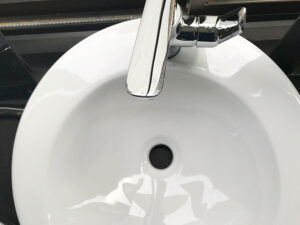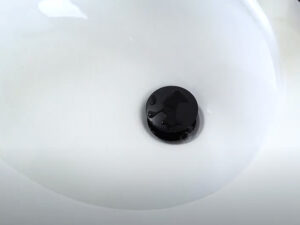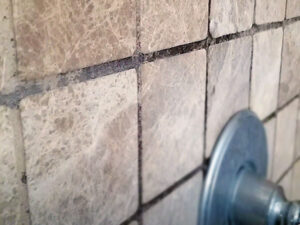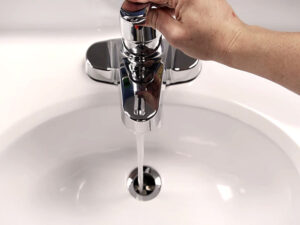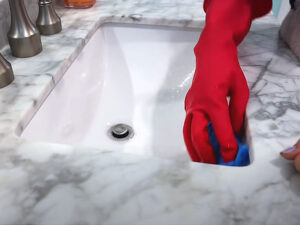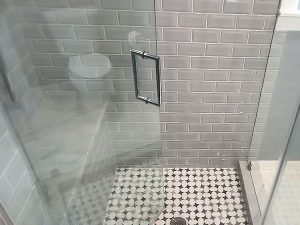Hello there! If you’re reading this, chances are you have noticed some unsightly rust stains in your bathroom sink. Don’t feel bad; I know the feeling too. As someone who takes pride in keeping their home tidy and clean, seeing orange-brown rust stains can be frustrating; however, with some easy steps, you can quickly eliminate these stubborn rust stains to restore its former beauty in no time.
Through years of trial and error, I’ve discovered what works best to remove rust stains from my bathroom sink. From mild to severe rust spots, these tips and tricks will help you quickly and efficiently eliminate them – so grab your cleaning supplies and let’s get going!
What causes rust stains in my bathroom sink?
Rust stains in bathroom sinks are typically caused by iron in the water supply, sitting for too long in a sink can result in the formation of rust stains over time. This is particularly prevalent in areas with hard water which contains higher levels of minerals like iron and calcium that leave an iron residue that then leads to corrosion stains in time.
Rust stains in bathroom sinks are often caused by exposure to metal objects or cleaning products with iron content, such as those left lying around or used for cleaning the sink with these cleaning agents. Such exposure often leaves behind rust stains.
Poor ventilation in a bathroom can contribute to rust stains forming on a sink. When moisture and humidity buildup occurs in this environment, bacteria and fungi growth occurs which eventually leads to rust stains forming on its surfaces.
Regular cleaning and maintenance can help prevent rust stains in bathroom sinks from forming, such as by regularly using mild cleaning agents and not leaving metal objects behind in the sink. Installing a water softener may also help avoid mineral build-up that leads to rust stains in a sink.
How to Remove Rust Stains from a Bathroom Sink
Rust stains in a bathroom sink can be an unsightly sight. Luckily, there are various simple and effective strategies available for eliminating them to bring back its original state. In this section, we will explore four popular approaches for eliminating them from a sink.
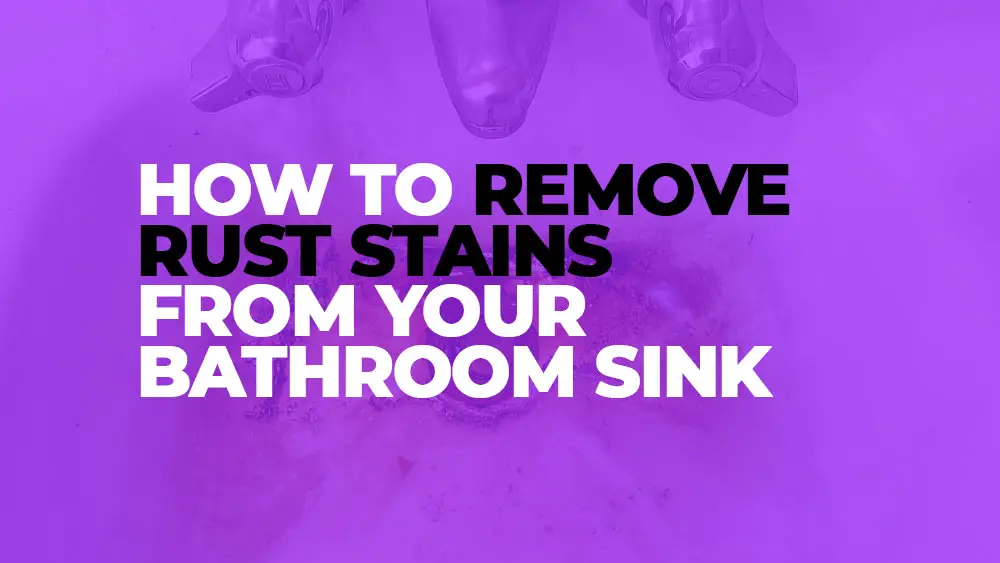
Method 1: Lemon Juice and Baking Soda
One of the easiest, natural ways to remove rust stains from a bathroom sink is by using lemon juice and baking soda together – this method not only proves effective but is also eco-friendly and cost-efficient.
Start by squeezing fresh lemon juice and pouring it into a bowl, before mixing 1-2 tablespoons of baking soda into it for use as an antirust paste. Baking soda acts as an abrasive while lemon’s acidity can dissolve rust stains effectively.
Use a clean cloth or sponge and apply a paste made of lemon juice and baking soda directly onto any rust stains with a mixture of lemon juice and baking soda, covering each spot completely and letting the paste sit for at least 30 minutes to give its power a chance to work its magic and break down any stubborn rust stains.
After 30 minutes, use warm water to rinse out the sink to remove both the paste and any stubborn rust stains that remain. If any stubborn spots still remain, repeat this step until they have all vanished completely.
The benefits of employing this method include its gentle yet safe nature for most types of bathroom sinks, including porcelain, ceramic, and stainless steel models. Furthermore, lemon juice and baking soda are natural substances that will not harm either the environment or your health.
Overall, using lemon juice and baking soda together is an efficient and natural method to remove rust stains from a bathroom sink. It is safe for most types of sinks, making this method accessible and affordable to most households. By following these steps homeowners can restore the appearance of their sink while keeping it looking rust-free for good!
Method 2: Vinegar and Baking Soda
Another effective and natural way of removing stubborn rust stains from a bathroom sink is with vinegar and baking soda, especially when other methods fail. This combination works especially well in getting rid of tough-to-remove rust spots from bathroom sinks.
Start by mixing equal parts vinegar and baking soda to form a paste in a bowl, with equal parts acidity in the vinegar and abrasion from baking soda working together to dissolve and eliminate rust stains.
Next, apply the paste directly onto rust stains using a clean cloth or sponge, making sure that it covers every stain completely and allowing at least 30 minutes for vinegar and baking soda to do their magic and break down the rust stains.
After 30 minutes, rinse the sink with warm water to wash away both the paste and any stubborn rust stains that remain. If there are still stubborn stains remaining, repeat this process until all stubborn stains have vanished completely.
One advantage of choosing this method is that both vinegar and baking soda are natural products that are safe for most types of bathroom sinks, and its implementation can be done easily at home at an economical price. Furthermore, this approach is both affordable and straightforward.
Consideration should be given when using vinegar as a natural and effective cleaning agent, since it could potentially corrode certain types of sinks. Therefore, before applying paste all over the sink it would be wise to test on an area first and see how it reacts.
Method 3: Relying on Commercial Rust Removers
If natural remedies don’t do the trick in clearing away bathroom sink rust stains, homeowners can turn to commercial rust removers which have been specifically developed to quickly and effectively dissolve and eliminate rust stains from bathroom sinks. These products contain ingredients designed to break down and eliminate rust stains quickly.
To properly use commercial rust removers, it’s crucial to read and follow all instructions on their label carefully. Most rust removers require application directly onto a stain before leaving it sit for some time before rinsing off with water. When using these harsh products it is also wise to wear protective gloves and take any necessary steps as they could potentially irritate skin or eyes.
Though commercial rust removers may be effective, they tend to be more costly and contain harsher chemicals than natural remedies. Therefore, it’s wise to limit their usage as much as possible and try natural options first before turning to commercial products.
As it’s essential that the rust remover you select for use on your bathroom sink be safe for that type, such as porcelain or ceramic, it is also vital that it meets specific safety guidelines. Some products may be too aggressive for these materials.
Method 4: Removing Rust Stains with Hydrogen Peroxide and Cream of Tartar
An efficient method for eliminating bathroom sink rust stains is by applying a combination of hydrogen peroxide and cream of tartar, particularly on older or deeper rust stains which have not responded well to natural remedies alone. This solution may even work more effectively.
Start by mixing one tablespoon of cream of tartar with two to three tablespoons of hydrogen peroxide to create a paste in a bowl, with cream of tartar acting as a natural bleaching agent and hydrogen peroxide serving as an all-natural cleaning agent.
Next, apply the paste directly onto rust stains using a clean cloth or sponge. Make sure that the entire stain is covered and allow at least 30 minutes for the cream of tartar and hydrogen peroxide to collaborate in breaking down and eliminating rust stains.
After 30 minutes, use warm water to rinse your sink to remove both the paste and any stubborn rust stains that remain. If any remain, repeat the process until they’re gone completely.
One advantage of choosing this method is that both hydrogen peroxide and cream of tartar are natural substances that won’t harm either your environment or health. Furthermore, this approach is affordable and simple enough for home use.
Note: Though hydrogen peroxide is a natural and effective cleaning agent, it should be remembered that its strong acids could potentially corrode certain types of sinks. Therefore, prior to applying any paste onto an entire sink basin, it would be prudent to test in small patches first and see how your results compare.
Tips for Effective Rust Stain Removal
No matter which method is chosen for rust stain removal, here are a few key tips that will ensure successful results:
Prevention Is Key: One of the best ways to deal with rust stains is preventing them from forming in the first place. For this, ensure your sink remains clean and dry after each use – this will help thwart rust from sticking to its surface and staining its surface.
Test a small area first: Prior to applying any cleaning solution to an entire sink, it is wise to conduct a preliminary test in a small area first in order to make sure that it does not cause damage or discoloration of its surface. This step will help ensure a successful outcome!
Wear Gloves: Some cleaning solutions, like commercial rust removers, can be harsh on the skin. To protect yourself while you clean your bathroom sink, it is wise to wear protective gloves.
Do not mix cleaning solutions: Mixing different solutions together can be hazardous and produce potentially toxic fumes, so it is best to adhere strictly to one cleaning product at a time, following its instructions closely.
Precautionary Measures: Before using any cleaning solution, it’s essential to take measures for its safe use, such as opening windows or using a fan to ventilate the room and prevent harmful fumes from gathering in your bathroom. Doing this will prevent harmful vapors from building up inside.
Removing rust stains from a bathroom sink is generally a straightforward and effortless process, using one of the methods outlined above and following these tips on effective stain removal, homeowners can effectively eradicate these unsightly marks to restore its aesthetic appearance.
How should I clean my bathroom sink to avoid rust stains?
In order to keep rust from forming in your bathroom sink, regular cleaning will help. How frequently cleaning needs to take place depends on factors like its level of use, water quality and type of cleaning products used.
As a rule, it is generally recommended that bathroom sinks be thoroughly cleaned at least once every week to avoid dirt, grime, and mineral deposits accumulating in them. If you live in an area with hard water, however, cleaning may need to occur more frequently in order to protect against mineral build-up that could cause rust stains on surfaces.
Cleaning your bathroom sink requires gentle cleaners to prevent damaging its finish and increase chances of rust stains. Be wary of harsh chemicals like bleach, ammonia and abrasive cleaners which may scratch its surface and create more risk for rust stains to form on its surface.
Regular maintenance can help protect against rust stains in your bathroom sink by fixing leaks, providing sufficient ventilation in the room, and installing a water softener if necessary.
By taking these steps, homeowners can maintain a bathroom sink that remains free from rust stains. Should any do occur, effective removal methods include both natural remedies and commercial rust removers.
What should I do if the rust stains in my bathroom sink are difficult to remove?
If the rust stains in your bathroom sink have proven difficult to eradicate, there are various strategies you could try in order to get them off of there.
Consider first using a commercial rust remover designed specifically for bathroom fixtures, which should be more powerful than natural remedies and can effectively eradicate even stubborn rust stains. Be sure to follow all manufacturer’s instructions, wear protective gloves when handling this product and wear safety goggles while handling.
If a commercial rust remover doesn’t do the trick, try mixing baking soda and hydrogen peroxide together into a thick paste and applying it directly onto rust stains. Allow it to sit for several hours before using a non-abrasive sponge or cloth to scrub it off.
A professional cleaning may be required in cases of particularly stubborn rust stains in your bathroom sink. Professional cleaners have access to powerful detergents and tools designed specifically to eliminate even the toughest of rust stains from sink surfaces.
Preventing rust stains from appearing is of the utmost importance, and regular cleaning and maintenance can do just that. Installing a water softener in areas with hard water may also prove effective; by taking preventative steps such as these you can ensure your bathroom sink remains free from rust stains for years to come!
Conclusion
Rust stains in a bathroom sink may be unsightly and difficult to eliminate, but there are numerous effective strategies for doing so. From natural solutions like lemon juice and baking soda, as well as commercial rust removers like hydrogen peroxide, homeowners have multiple tools at their disposal for eliminating even the toughest of rust stains from their sinks.
Regular cleaning and maintenance can help to avoid rust stains from forming in the first place, with homeowners using mild cleaning agents and not leaving metal objects in their sink. Installing a water softener may also reduce mineral build-up which could potentially cause rust stains.
To effectively remove rust stains, it’s crucial to follow instructions closely and wear protective gloves when using commercial cleaning products. In case of particularly stubborn stains, professional services may also be necessary.
By employing the necessary tools and techniques, homeowners can keep their bathroom sinks looking rust-free for many years to come. By being proactive about cleaning and maintenance tasks, rust stains will not form and you can ensure your sink remains an elegant part of your home.


